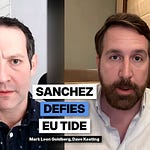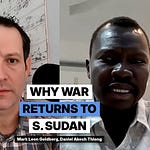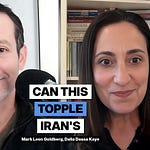About 24 hours before the Halifax International Security Forum kicked off on Friday, news broke of a 28 Point “Peace Plan” for Ukraine that emerged from meetings between American and Russian officials. The “plan” reads like a laundry list of Russian demands: Ukraine would be required to cede significant territory (including places that Russia doesn’t even control) Kyiv would sharply reduce the size of its armed forces, and swear off ever joining NATO, among many other concessions that are an affront to Ukrainian sovereignty. And it was backed up by a threat from the Trump administration to cut off Ukraine should they not accept it by Thanksgiving in the United States. That’s this Thursday.
The Halifax International Security Forum always includes a sizable and bi-partisan group of United States Senators who were suddenly put on the spot: Did they think Ukraine should accept this ultimatum? By Saturday afternoon, several senators issued a joint statement condemning this plan.
“We share significant concerns over the details of the reported peace plan that has been released. For over 10 years, Russia has illegally occupied Ukrainian territory and for almost 4 years, Ukraine has admirably defended itself against Russia’s attempts to fully occupy Ukraine. No one wants a just and lasting peace more than the Ukrainian people. However, we will not achieve that lasting peace by offering Putin concession after concession and fatally degrading Ukraine’s ability to defend itself,” reads a joint statement from Jeanne Shaheen (D-NH), Thom Tillis (R-NC), Peter Welch (D-VT), Chris Coons (D-DE) and Angus King (I-ME).
Then something extraordinary happened. A couple hours after this joint statement was released, an even larger and more bi-partisan group of senators gave a press conference in which Republican Senator Mike Rounds said that he and two other senators had just got off the phone with Marco Rubio, who was en route to Geneva to meet with Ukrainian officials and European allies. According to Senator Rounds, Rubio said this stridently pro-Russian 28 point plan was not an American plan at all, but rather a Russian proposal that was improperly leaked to the press. But then, about two hours later, Rubio publicly disavowed that disavowal! He posted on Twitter that “The peace proposal was authored by the U.S.”
So what the heck is going on here? I caught up with Toronto Star columnist and fellow Substacker Justin Ling to try to make sense of this bizarre turn of events. We kick off discussing the back and forth on this plan, but then have a deeper conversation about what this episode reveals about American global leadership and what the conversations in Halifax revealed about how America’s traditional middle power allies, like Canada and Europe, are adjusting to a world order in which the United States is an unreliable ally and unstable international actor.
This is my fourth Halifax International Security Forum, and once again, for three days, Nova Scotia became the center of the foreign policy universe. I’ll have more content recorded in Halifax coming out over the next few days, including two powerful podcast episodes on topics I wouldn’t have even known about were it not for chance encounters at the conference. Stay tuned!













